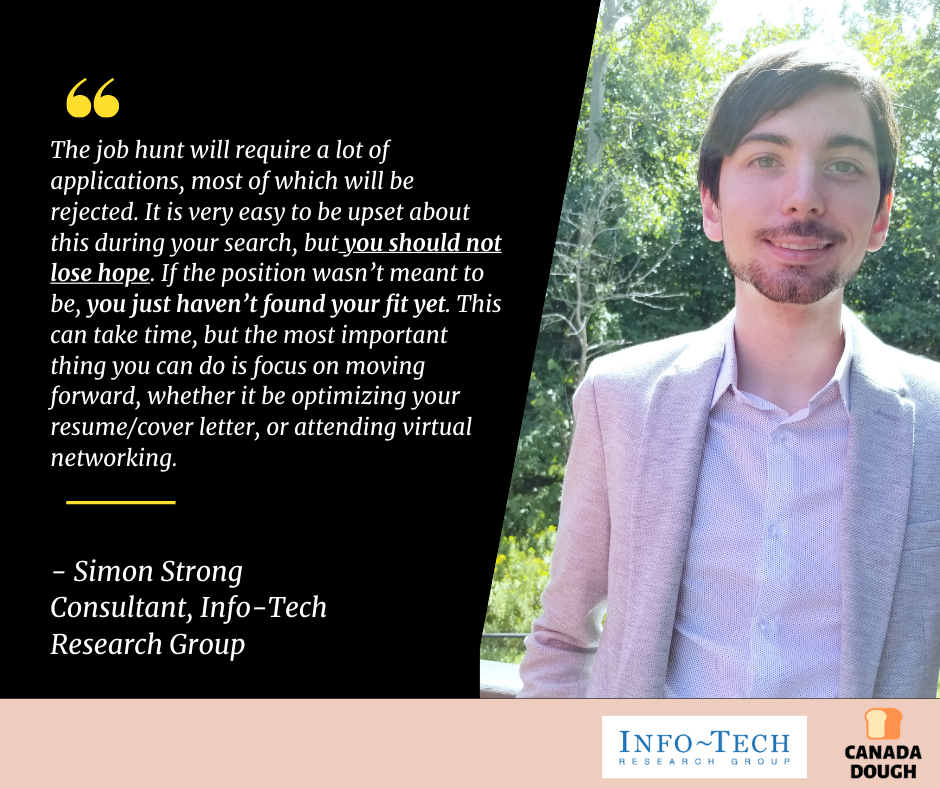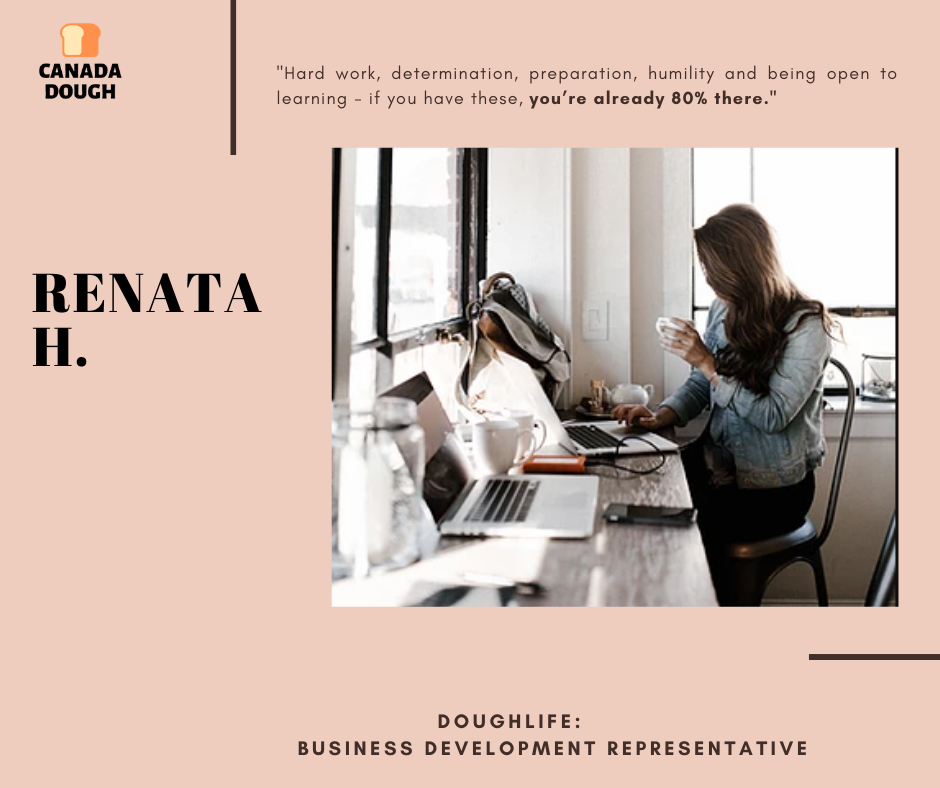Dough Life: A Day in the Life of a Data & Analytics Consultant
- Canada Dough

- Jan 13, 2021
- 5 min read
Name: Simon Strong
Role: Consultant at Info-Tech Research Group

About Me
Hello everyone! My name is Simon Strong.
I’m a consultant at Info-Tech Research Group (ITRG). I’m a graduate of the International Bachelor of Business (iBBA) and Master of Business Analytics (MBAN) programs at the Schulich School of Business. In my spare time, I’m a guitarist, archer, and gamer.
Why do I like this role? Working with multiple clients, every project feels like a new role, which keeps my job interesting. Seeing how Data & Analytics solutions are applied in the real world has been a great learning experience. My team has also been incredibly supportive.
1. What is your role? What does your job entail?
I am a full-time consultant at ITRG. I have been in this role since October of this year.
When assigned to a project, my tasks include preparing slide decks, writing client reports, and presenting to clients. The goals of projects typically involve addressing specific data management problems the client is facing (e.g. data integration, limited BI functionality) or can be broader (e.g. the creation of a Data Governance Strategy for the organization).
Outside of client projects, my responsibilities include business development activities, such as preparing proposals for potential clients.
2. What does a typical work day look like, for you? What is your work-life balance like?
To keep the team coordinated while everyone is working from home, we have been doing team meetings on a tri-weekly basis. As a new employee, this has been important for me, as it has allowed me to get to know my team properly.
The rest of my day can vary considerably depending on what I’m working on. When I’m assigned to a high-priority project, I can spend entire days working on related tasks (e.g. conducting interviews with the client’s stakeholders, writing a findings report) to the point that I feel like I'm an employee at the client’s organization. Other times, I can perform research for business development, or help my colleagues with their projects. There are also opportunities for training and personal development.
What is your work-life balance like? With work-from-home, lack of commute has made it very easy to fit in leisure time after work. There are busy weeks, but overall, a good work-life balance has been maintainable.
3. What appealed to you about this particular organization?
Officially, I work at ITRG’s office in Toronto. However, since starting, and until the pandemic is over, I work at my home in Richmond Hill.
While applying, it appeared that the job would encourage me to be constantly learning and staying up-to-date on new methods and information within Data & Analytics. The work seemed interesting, and the workplace culture seemed supportive. Having started working in the role, I am happy to say that all of this turned out to be true.
4. What aspects of your job do you enjoy? What keeps you up at night?
I like the types of work we do for clients, and I like that there is a constant opportunity for continuous learning. For example, I recently attended a course the company held for employees on ArchiMate, a software used for visualizing Data Architecture.
Above all, I have most enjoyed getting to know my colleagues, on both a professional and personal basis.
While I’m sometimes kept up at night because I’m working late on a project, my mind is otherwise at ease.
RECRUITMENT PROCESS
5. What would the ideal candidate look like? Describe any relevant skills, experiences, traits, etc.
A misconception I had about Data & Analytics Consulting from my time in the MBAN program is that job requirements would heavily emphasize technical skills (e.g. programming languages). Instead, I found that communication and business acumen were the most essential skills of a successful applicant. While it is still important to understand the methods and technologies that are out there, it is more important to have experience in client-facing roles, and the knowledge to deal with such scenarios. Aside from that, important character traits would be those that are conducive to teamwork and continuous learning.
6. What did the application/interview process look like for you? How did you get your foot in the door?
I was made aware of the position through the career development office at Schulich. ITRG as a company has connections with the school, and thus wanted to encourage MBAN graduates to apply. This allowed me to directly apply through email with my resume and cover letter (avoiding the normal online process).
I completed an initial interview around a week after applying. At the end of this interview, I was asked to complete a slide deck for a case question, due within a week. A few days after submitting, I was contacted to schedule a final interview. A few days after this interview happened, I was told I would receive an offer.
Overall, this was one of the more efficient application processes I have gone through.
7. How did you stand out in the application process?
During the MBAN program, students have to complete a project-placement at an actual company, in what is called the Analytics Consulting Project (ACP). My placement was at Deloitte, in their AI consulting practice. During my interviews, I found that reactions were very positive when I would mention my time at Deloitte and the project I worked on, as it showed the first-hand experience in consulting and knowledge of the services provided within Data & Analytics.
I found during the interview the ability to design professional PowerPoint decks was essential to my role. As a result, I made sure that my submission for the case question deck was as visually appealing and client-friendly as possible.
8. Looking back, was there anything you could have improved during your application process, or mistakes that you noticed other applicants had made?
I was not as prepared as I should have been to emphasize my experiences interacting with clients. While I was still able to successfully rework some of my prepared responses to address questions about client-facing environments, these questions may have gone smoother had I been prepared to emphasize the client-facing focus of my experiences.
In terms of feedback regarding my case submission, it was very positive, one criticism was that I had made the deck too long. In hindsight, I should have kept the same level of visual appeal, but made more effort to strike a balance of both comprehensiveness and concision.
9. Were there any surprises in your job search experience or things you wished you had known earlier?
Speaking generally about looking for work during the pandemic, I wish I had known from the beginning how important networking still is, even when people are not meeting in person. While I started attending virtual events near the end of my job search, beginning earlier may have yielded more rewards. Based on the experiences of my fellow MBAN graduates, I would also say reaching out to contacts for Zoom Chats turned out to be much more important than I anticipated.
10. What advice would you give to someone who wants to break into your role/program?
Connections from your school network and past employment are very important and should be leveraged fully. While not essential, they allow employers to have a better sense of who they’re hiring, making you less of an unknown quantity, and allowing you to potentially speed up the application process.
The job hunt will require a lot of applications, most of which will be rejected. It is very easy to be upset about this during your search, but you should not lose hope. If the position wasn’t meant to be, you just haven’t found your fit yet. This can take time (for me, there was a six-month gap between the conclusion of my studies and my start-date at ITRG), but the most important thing you can do is focus on moving forward, whether it be optimizing your resume/cover letter, or attending virtual networking.




Commentaires